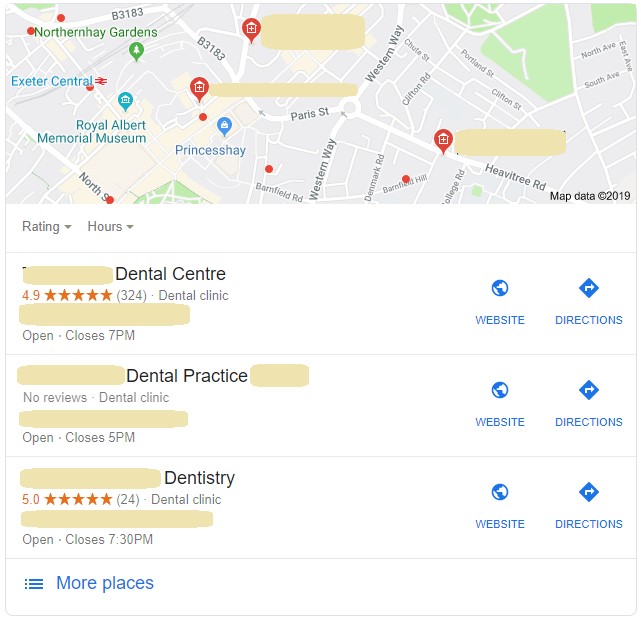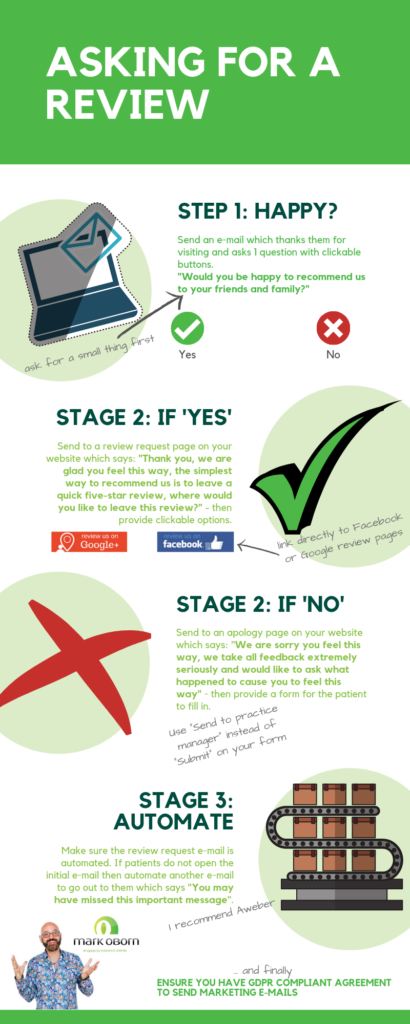We hear lots nowadays about asking for reviews, it’s nothing new – dentists have been asking patients for testimonials for years.
We used to put them in a little book in the practice or perhaps place them in photo frames on the walls, but nowadays reviews and testimonials have gone digital. And everyone is looking at them!
Why are reviews important?
Reviews are important for a few reasons:
- They give prospective patients the opportunity to see what other people say about you
- They provide social proof
- They can help your website to rank higher in the search results on Google.
Let’s look at each of those in a little more detail.
What do others say about you?
Classically this is what the old school testimonials did, they allowed prospective patients (and indeed current patients) to see what others say about you.
It gives the opportunity for a prospective patient to identify someone that is like themselves. When they have identified similarity between a happy customer and themselves, then they can feel that they might receive the same treatment.
This is why it’s important that when you ask patients for a review, you encourage them to talk specifically about their own personal dental problem and how you helped them.
If a review just says ‘this dentist is very good’, it is far more difficult for someone to connect with the person leaving the review.
If the review said ‘I really disliked my crooked teeth because I felt I couldn’t smile in photographs. I now feel so much more confident after having treatment, this dentist is very good’, this allows someone to connect.
They can now say to themselves:
- ‘This patient had crooked teeth, I have crooked teeth as well… We are alike’
- ‘This patient couldn’t smile in photographs, I can’t smile in photographs either… We are alike’
- ‘I don’t feel very confident about my smile, this patient didn’t feel very confident either… We are alike’
- ‘This dentist managed to help this previous patient, that previous patient was just like me, perhaps this dentist can help me also’.
Social proof
This is a phrase first coined by Robert Cialdini back in 1984.
It is a psychological and social phenomenon whereby, in uncertain circumstances, people have a tendency to look to the largest group of people for the best way to behave. He states that ‘We conform because we believe that others’ interpretation of an ambiguous situation is more accurate than ours and will help us choose an appropriate course of action’.
The result of this is that if there is ambiguity about which dentist to visit, most people will side where the largest group of people say is the best place to go.
Social proof is usually more powerful when the largest group of people are perceived as being especially knowledgeable.
This is why your reviews should be as in-depth as possible, to allow the person reading the review to acknowledge that the person writing it is more knowledgeable about your treatment services than they are.
So how can people identify what the largest group of people believe?
This is a search for ‘Dentist Exeter’ (I randomly selected it, there is no particular reason).

It becomes immediately apparent that the top dental practice has 324 reviews. The next one down doesn’t have any reviews.
Would you rather go somewhere that has 324 positive reviews or somewhere that doesn’t have any?
Reviews helping your website rank higher
The image you see above is what is known as Google’s ‘Local Pack’, it appears whenever you include a geographical location in your search term.
There are multiple factors that determine which dental practices Google shows in the Local Pack, however, it’s been demonstrated multiple times that there are two primary factors:
- The number of reviews
- How many other Google friendly pages in your website that are already ranking.
It’s the combination of the above factors which will determine whether you appear in this Local Pack search result.
How to get more Google reviews
There are a variety of ways to ask patients, from simply asking them to leave a review to using a digitised system in the practice such as reputation.com (which does work incredibly well, I hasten to add, as I have a few clients that use it).
The one thing I’ve noticed is that asking for small things first can get much better response rates.
It seems that if we ask people a very simple small question, which is easy to answer, they are then more likely to leave a full review.
I use my own simple system via e-mail, as follows.
And remember, encourage the patient to talk as much as they can about the treatment they had, how they felt beforehand and what problems the treatments solved. This then allows other people to connect with them, thereby providing social proof.

About Mark Oborn
Mark is the only person in dental digital marketing to have a Master’s Degree in Business (MBA) majoring in marketing and creativity, PLUS has run a dental business for 14 years and been working in dentistry for 23 years as a GDC registered technician. He’s also a Master Practitioner of the communication modelling system, Neurolinguistic Programming (NLP), as well as being a Master Practitioner of Hypnosis and a Master NLP Coach.
He speaks the language of dentistry, communication and digital marketing fluently.
Tel: 0845 259 1232
www.markoborn.com